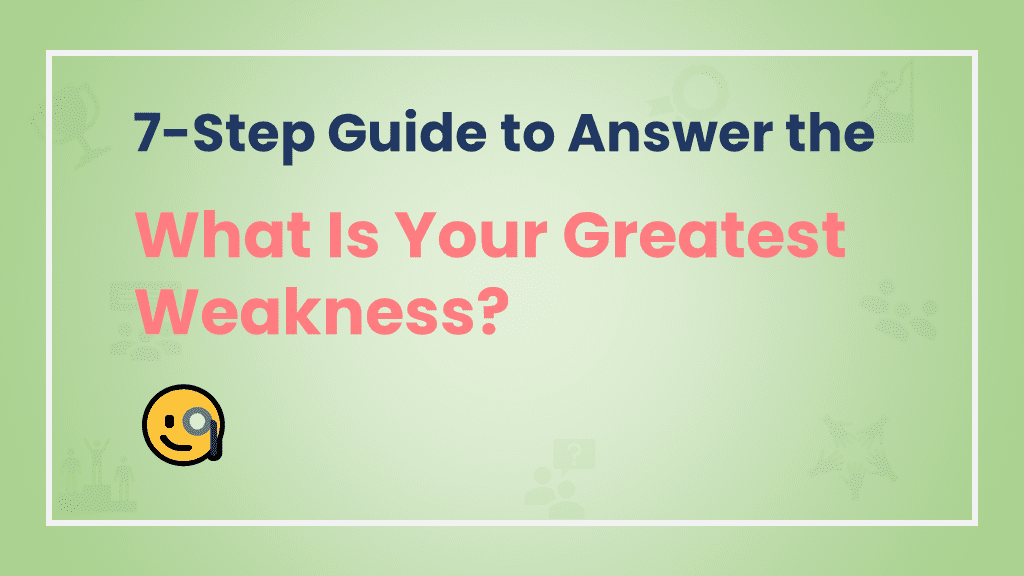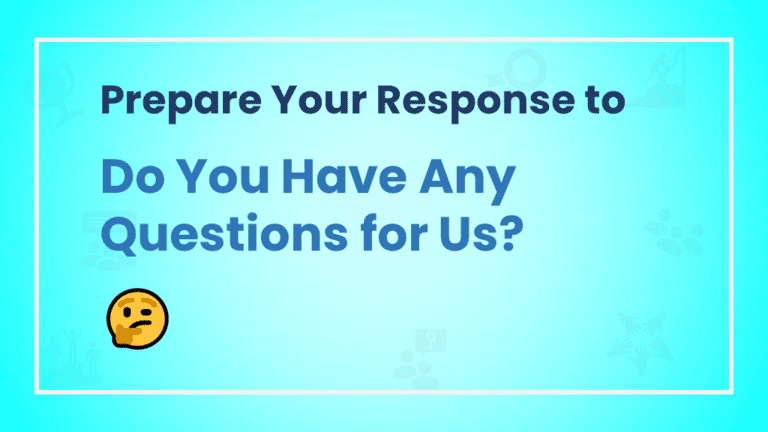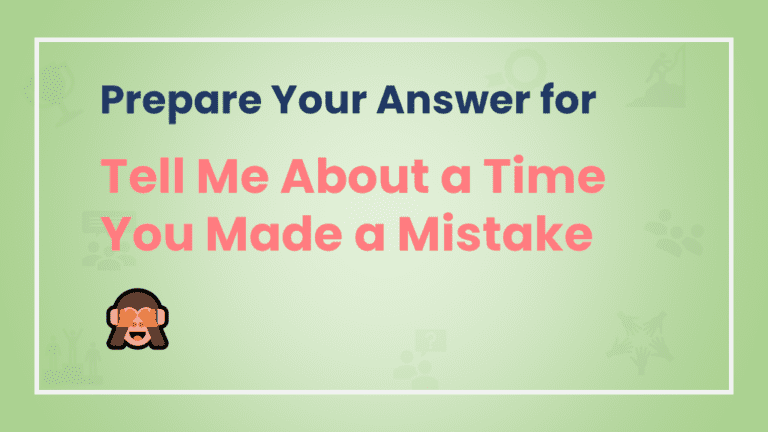One common question that often leaves candidates stumped is, “What Is Your Greatest Weakness?” 🤔 Fear not! In this guide, we'll show you how to tackle this tricky interview question with confidence and finesse. 🎯 Preparing for a job interview can be nerve-wracking, but with the right strategies, you can turn those butterflies into soaring eagles!

7-Step Guide to Answer the “What Is Your Greatest Weakness?” Interview Question
1. Embrace Self-Reflection 🤔
Before the interview, take some time to reflect on your professional journey. Identify areas where you've faced challenges or have room for improvement. It's essential to choose a genuine weakness that doesn't negatively impact your ability to perform in the role you're interviewing for. 🧐
2. Turn Weaknesses into Strengths 🔄
The secret to answering this question lies in how you frame your response. Instead of dwelling on your weakness, focus on how you've actively worked to overcome it. For instance, if you struggle with time management, you could say, “In the past, I used to struggle with time management, but I've since learned to prioritize tasks effectively by using productivity tools and techniques.” This demonstrates your self-awareness and commitment to personal growth. 💪
3. Highlight Professional Development 📚
Discuss any steps you've taken to address your weakness, such as courses, workshops, or seeking mentorship. Employers value candidates who invest in their professional development and are proactive in addressing weaknesses. 📈
4. Show Results 📊
To truly impress your interviewers, share specific examples of how you've improved in the face of your weakness. If you once had difficulty with public speaking but have since conquered it, mention your successful presentations or any positive feedback you received. This tangible evidence will showcase your ability to learn and adapt. 🗣️
5. Align with the Role 🎯
Tailor your response to align with the requirements of the job. For example, if you're interviewing for a role that requires attention to detail, you could mention how you've developed this skill over time. This demonstrates your suitability for the position. 🔍
6. Practice, Practice, Practice! 🔄🔄
Don't underestimate the power of practice. Enlist a friend or family member to conduct mock interviews with you. The more you rehearse your response, the more natural and confident you'll appear during the actual interview. 🗣️
7. Stay Positive 🌟
Remember that the “greatest weakness” question is an opportunity to showcase your self-awareness, growth mindset, and determination. Stay positive throughout the interview and maintain a can-do attitude. 🙌
5 sample answers for What Is Your Greatest Weakness
Here are five sample answers to the “What Is Your Greatest Weakness?” interview question:
Sample Answer 1: Time Management
Weakness: “In the past, I struggled with time management, often finding myself overwhelmed by multiple tasks and deadlines.”
Improvement: “However, I recognized this weakness and decided to take control. I started using time management tools like the Pomodoro Technique and project management software. This significantly improved my ability to prioritize tasks effectively and meet deadlines.”
Sample Answer 2: Public Speaking
Weakness: “One of my earlier weaknesses was public speaking. I used to get nervous and stumble over my words during presentations.”
Improvement: “To overcome this, I enrolled in a public speaking course and joined a local Toastmasters club. Over time, I gained confidence and developed strong communication skills. Now, I actively volunteer for public speaking opportunities within my current role.”
Sample Answer 3: Perfectionism
Weakness: “I have a tendency towards perfectionism, which sometimes leads to spending excessive time on tasks to ensure they are flawless.”
Improvement: “I realized that this could hinder efficiency, so I've learned to strike a balance. I now set clear priorities and use the 80/20 rule to focus on achieving 80% perfection in less time. This allows me to be more productive and meet deadlines without compromising quality.”
Sample Answer 4: Delegating Tasks
Weakness: “Delegating tasks was a challenge for me. I used to believe I could handle everything on my own, fearing that others might not meet my standards.”
Improvement: “Recognizing this, I actively sought opportunities to delegate within team projects. I learned to trust my colleagues and their abilities. As a result, our team became more efficient, and I improved my leadership skills by empowering others to take on responsibilities.”
Sample Answer 5: Technical Skills
Weakness: “In my earlier career, I lacked proficiency in certain technical skills relevant to my field.”
Improvement: “To address this weakness, I took online courses and attended workshops to upskill. I also sought guidance from senior colleagues and mentors. Over time, I became proficient in those technical areas, allowing me to contribute more effectively to projects.”
Remember to adapt these sample answers to your own experiences and ensure they align with the job you're interviewing for. The key is to demonstrate self-awareness, a commitment to self-improvement, and the ability to turn weaknesses into strengths.
More Sample Answers for Five Different Job Scenarios
Here are sample answers for the “What Is Your Greatest Weakness?” question tailored to five different job scenarios:
Job Scenario 1: Marketing Manager
Weakness: “In the past, I struggled with data analysis. While I excel in the creative aspects of marketing, I found it challenging to derive actionable insights from data.”
Improvement: “To address this, I proactively enrolled in online courses in data analytics and familiarized myself with marketing analytics tools. This allowed me to bridge the gap between creativity and data-driven decision-making, resulting in more effective marketing campaigns.”
Job Scenario 2: Software Developer
Weakness: “I used to have difficulty asking for help when encountering complex coding problems. I would often spend excessive time trying to solve issues on my own.”
Improvement: “Recognizing the importance of collaboration in software development, I've actively worked on this weakness. I now regularly engage with team members and seek their expertise when needed. This not only improves my problem-solving efficiency but also fosters a stronger sense of teamwork.”
Job Scenario 3: Project Manager
Weakness: “I have a tendency to over-prioritize work, which sometimes leads to micromanagement. I like to ensure everything is on track.”
Improvement: “To address this, I've learned to trust my team's capabilities and delegate tasks more effectively. By empowering my team members and providing them with autonomy, I've seen improved project outcomes and a more motivated team.”
Job Scenario 4: Customer Service Representative
Weakness: “I used to take customer feedback personally, which could sometimes affect my ability to handle difficult interactions.”
Improvement: “Over time, I've developed emotional resilience and the ability to separate personal emotions from customer interactions. Now, I view feedback as an opportunity for growth and strive to provide exceptional service regardless of the circumstances.”
Job Scenario 5: Financial Analyst
Weakness: “I initially struggled with public speaking and presenting financial data to non-financial stakeholders. I was more comfortable with spreadsheets than public speaking.”
Improvement: “To overcome this weakness, I enrolled in a presentation skills course and actively sought opportunities to present my findings to colleagues and clients. This helped me communicate complex financial information in a clear and understandable manner, enhancing the value of my analysis.”
Adapt these answers to your own experiences and the specific job role you're interviewing for. Remember to emphasize your dedication to self-improvement and how you've actively worked on turning your weaknesses into strengths to excel in each respective position.
Conclusion:
Navigating the “What Is Your Greatest Weakness?” interview question doesn't have to be a daunting task. By embracing self-reflection, turning weaknesses into strengths, highlighting your commitment to professional development, and aligning your response with the role, you can impress your interviewers and leave a lasting impression. 🌟 So, go ahead, tackle that interview with confidence, and show them why you're the perfect fit for the job! 💼👔✨





